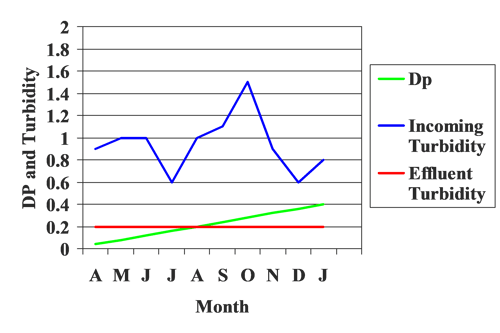Filtration is a step intrinsic to many manufacturing processes that helps to guarantee the final quality and specification of your product. It's also an area of spend that is often targeted by purchasing departments as ripe for savings.
Short term gains can have long term costs
When conducting annual spending reviews on water filtration, it is very tempting to focus on the purchase cost of consumable filters alone. In the short term this might satisfy a metric on a business scorecard, but are you aware of the possible hidden costs of this decision?
It's important to look at the total lifetime costs of the filtration process linked to performance criteria such as service life and filtrate quality.
To demonstrate some of the potential hidden costs, let's look at the municipal water industry as an example.
6 questions that reveal hidden costs of municipal water filtration
Municipal water companies are being challenged by OFWAT to provide better value for money for the consumer in the AMP 7 priorities. A quick win for procurement could be to switch to a low-cost supplier of filters.
1. Will the filter provide the same in-service lifetime and filtrate quality?
Retrofitting a filter with the same micron rating on the label does not guarantee the same performance. Many low-cost filters have very poor depth characteristics which can lead to premature blockage and lower water quality. This can result in the cost of filtration rising rather than falling.
This is not just due to a higher number of filters being used but also related costs such as downtime to change filters and the resource and expense required to do this.
2. If a filter is DWI R31 approved, does it have comparable performance?
Approval to R31 is a prerequisite for products used in a municipal water supply network. It guarantees that the introduction of the filter will not adulterate the water i.e. the materials of construction are safe. It doesn't inform the user of the in-service performance of the filter.
At Amazon Filters, we are the manufacturer and therefore directly control the quality and performance of our products. Approval to R31 does not necessarily mean the holder of the approval manufactures the product. It is prudent to ensure the supplier has direct control of quality and is accredited to the likes of ISO9001 and Achilles UVDB.
3. Is the filter properly validated?
Amazon Filters has validated its municipal water filters for cryptosporidium removal using live crypto testing at an approved third-party lab at extreme as well as normal operating conditions and has tested filters for removal efficiency at high dP / end of life conditions as well as normal service.
It is easy to say a filter removes 1 micron particles, but can it do it throughout its service lifetime?

Retention characteristics of Amazon Filters SupaSpun II R31
4. Will it provide consistent performance?
To manufacture filtration products that all perform to specification day in day out requires a business infrastructure and resource which is dedicated to quality. Amazon Filters has been established for over 35 years and has a long track record of making some of the best-performing depth filters on the market. This requires continuous significant investment, and while we are always striving to bring great value through our pricing, we prioritise our quality and product support.
This ensures you as a customer have absolute confidence in us as a supplier.

Consistent effluent turbidity levels with Amazon Filters
5. What happens if something goes wrong?
Raw water quality can change quickly due to a drought or flood event. This can quickly blind filters due to an increase in contaminants and prevent access to critical water sources in emergency situations.
At Amazon Filters, we have a great track record of manufacturing municipal water filtration solutions on the same day, to keep the taps flowing. We have more than 20 meltblown machines in two facilities with a production capacity of over 3 million filters per year, meaning we have the flexibility to supply what you need when you need it.
6. What happens if a filtration solution at one borehole works at another for the same application?
Varying levels and types of contaminants can mean that specific filter products may have to be developed to solve a problem economically.
Amazon Filters are adept at customising filter structures to solve specific application challenges. For example, we are currently looking at a hybrid filter for iron removal at one site to combine two stages into one to ensure running costs are kept to a minimum.
Can low-cost filter suppliers offer this level of support?
Get expert support from an experienced filtration manufacturer
Application knowledge goes a long way in municipal water filtration. We have a team of technical and proposals engineers dedicated to designing the most appropriate filtration system to ensure your water quality while minimising TOTEX. You may well be able to get a cheaper solution elsewhere in terms of capital spend but has it been designed to maximise filter lifetime and reduce overall consumable spend?
To guarantee that our customers are always provided with the best products, quality, technical, and logistical support for their businesses we invest in our infrastructure.
We could take a different approach, cut these areas of investment and pass the savings on to you. We won’t do this as our reputation and your business is too important to us and we believe that it represents a false economy. So next time you are approached with an offer of a substantial reduction in filter pricing we simply ask that you consider the questions above.


